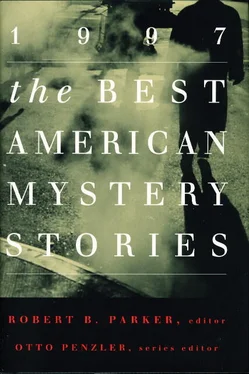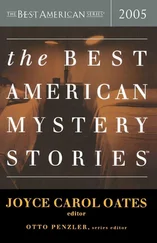O. P.
Whoever wrote the first mystery (Job?), Arthur Conan Doyle’s invention of Sherlock Holmes created the category. And when American stories about detectives appeared, the category was there to receive them, even though their ancestry is rather different. The unstated, perhaps even unthought assumptions about life that underlie the Holmes stories are that a rational God created a reasonable world. His will is manifest in His creation. Crime is an unreasonable deviation from the norm, and a man of superior reason can restore the norm by solving the crime. It is a triumph of intelligence, smaller in scope but not different in kind from the triumph of intelligence that contrived the original creation. The detective’s success is a restoration of the grand design. Since God’s will is manifest in His creation, that is to say, nature, then one can understand His will by studying nature. Thus at heart the kind of story that Dr. Doyle was writing celebrates the triumph of science (the rational examination of evidence), which in Dr. Doyle’s time seemed well worth celebrating. The kind of story that posits such a universe and such a triumph is often called the English (or ratiocinative) detective story, and the designation is useful enough as long as we know that Americans write that kind of story as well, and that many English writers don’t.
The confidence in a rational universe was harder to maintain after war in the trenches, and the sense of a wasteland world modified literature on both sides of the Atlantic. Moreover, the last hundred years have brought to our attention a universe that seems, frankly, not to give a damn. The insights of Freud and Marx suggest that we are much less the products of rational plan and far more the victims of forces we don’t understand and often can’t control. The experience of several wars has underscored the inefficacy of human planning. If there was design to Verdun, it was of darkness to appall.
The United States was founded by the movement from east to west, from Europe to America, from Boston to St. Louis, from a condition of settled society to one outside of the settlements. We remain to this day the descendants of people who left the settlements and the rule of law to find something else, influenced (even when they didn’t approve of it) by the Protestant Reformation, which urged that right conduct was an individual responsibility (every man his own priest), not a hierarchal one. Thus most of us (except the descendants of those who came in slavery, and the descendants of those who were already here and got rolled over by the westward movement) derive from people for whom civilization is perceived as limiting and life outside of it is understood to be freeing. We come from people who in repetitive waves lit out for the territories where heroism was possible. Where anything was possible. It is the American myth. The myth of the West.
Moreover, it was a rather short step from seeing God’s design in nature to seeing God in nature. Our founding documents appeal to nature and to “nature’s God.” The European romanticism of the early nineteenth century, which gave rise to the American transcendental movement of the mid-nineteenth century, reinforced the belief that civilization was the danger and wilderness was the refuge. To be part of civilization was inevitably to be part of the problem.
But, the West being lawless and therefore dangerous, the custodians of the myth, those who actually had to live the imaginings of philosophers and poets, were men with guns (every man his own cop). And the man with a gun became a staple of American fiction. He was alone, outside of society, compelled by his own rules. Neither against the law nor of it, keeping his moral integrity hard and intact. Though he was often the hero of popular fiction written with indiscriminate crudeness, his story still retained some grace of tragedy because he was finally, often reluctantly, but inevitably, a killer of men. “The essential American soul,” D. H. Lawrence noted, “is hard, isolate, stoic, and a killer.” It is this aspect of the myth of America that informs much of American fiction. The man with a gun filled the pages of dime novels until the frontier closed and the West was gone. Then the dime novels became pulp magazines and the cowboys dismounted, but kept their guns and became detectives. The American detective story has much more to do with James Fenimore Cooper than it does with Edgar Allan Poe.
Like his ancestor, the American detective is usually alone, he is outside the rules of his society; even when he’s with the police he is often at odds with his employer. For him the West as a place of purity and freedom is internalized and rarely spoken of. The tragic grace he inherited from his Western ancestors is made more graceful perhaps by the sense of deeply defended innocence that he contains. The price he pays for this innocence is isolation. There are no territories left to light out for. The isolated self is the only refuge from the now pervasive civilization. The kind of detective fiction produced by these circumstances has come to be called American (or hard-boiled), and again the designation will do, with the caveat above.
In fact, of course, the two streams of detective fiction have flowed together often enough so that each has influenced the other, and the changes that they have imposed on each other have been part of the evolution of detective fiction. The English mode has gotten tougher, and the American has become more thoughtful. In the works of Rex Stout, of course, the two streams merged in the persons of Nero Wolfe and Archie Goodwin.
At this point in the twentieth century, except in the most nostalgic of detective fictions, the world of the detective is, in the words of Raymond Chandler, “a world in which gangsters can rule nations and almost rule cities, in which hotels and apartment houses and celebrated restaurants are owned by men who made their money out of brothels, in which a screen star can be the finger man for a mob, and the nice man down the hall is a boss of the numbers racket; a world where a judge with a cellar full of bootleg liquor can send a man to jail for having a pint in his pocket, where the mayor of your town may have condoned murder as an instrument of money making, where no man can walk down a dark street in safety because law and order are things we talk about but refrain from practicing; a world where you may witness a hold-up in broad daylight and see who did it, but you will fade quickly back into the crowd rather than tell anyone because the hold-up men may have friends with long guns, or the police may not like your testimony, and in any case the shyster for the defense will be allowed to abuse and vilify you in open court, before a jury of selected morons, without any but the most perfunctory interference from a political judge.”
The detective facing such a world cannot restore the natural order of things through his superior intellect. This is the natural order of things. Crime is not a deviation from the norm. It is the norm. So the smart guy needs to be tougher, and the tough guy needs to be smarter.
The American tough guy was established by Dashiell Hammett, who, like Doyle, may not have been the first, but was obviously the most important. In The Maltese Falcon , Spade tells a story to Brigitte O’Shaughnessy about a man named Flitcraft (like so many of Hammett’s names, it tells us something about its bearer). Flitcraft was almost killed once by a falling beam at a construction site. This revealed to him that life was random, and he decided to live it randomly. He left his family and his job and drifted. But after a while he found himself in a similar job with a similar family. When beams fell, he adjusted to their falling. When they didn’t fall, he adjusted to that. The story seems to Brigitte like an idle way to fill time, but it is not. It is a parable about Spade’s understanding of reality and should serve to warn Brigitte of what she can expect from Spade. But Brigitte doesn’t get it. No one does. Everyone else reacts to the most recent stimulus. Only Spade understands what life is really like. It is why he wins.
Читать дальше












